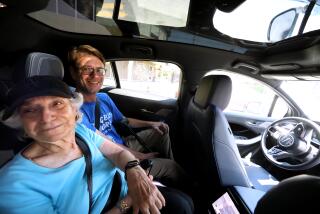Driven to rethink this law
- Share via
Sharon Warmack went to the dentist’s office in Redondo Beach and ended up feeling a lot of pain.
The tooth-pulling went smoothly enough. But when she woke up from her anesthesia haze several hours later in her apartment, she found herself in a world of hurt.
While she was sleeping, her well-meaning boyfriend picked up her car from the dentist’s office and headed back to her apartment. On the way, he was pulled over by Redondo Beach police, who discovered he had a suspended license. The officers impounded Warmack’s 1999 Dodge Intrepid under the Safe Streets Act.
What with the towing and the garage and other city fees, her boyfriend’s act of kindness eventually cost Warmack $1,397.
“It’s a whole lot of money just to give away like that,” said Warmack, who broke no laws herself. “I’m very, very angry. But there’s nothing I can do.”
Funny thing: Warmack, 33, works at the information counter at Inglewood City Hall. Very often she helps people who’ve had their cars impounded.
It seems wrong, really, that you can be a law-abiding, bill-paying citizen and still have your car taken from you. But in tough-on-crime California, that’s how the law works.
The Safe Streets Act is one of the strictest in the nation when it comes to unlicensed drivers.
Intended as a tool against drunk drivers, it allows police to impound vehicles driven by people with suspended licenses -- even if they’re not the registered owners.
The law scares us out of giving our car keys to our alcoholic friends and relatives who’ve lost their licenses. Fair enough.
But because it’s so broad, it also applies to tons of people with relatively mundane moving violations. It punishes their families and hits working people and the poor disproportionately hard.
What’s more, the police often ignore a provision that allows exemptions in cases like Warmack’s, according to Elena Ackel of the Legal Aid Foundation of Los Angeles.
Ackel explained to me how the system can work in unintended ways.
Let’s say you don’t make that light before it turns red. The fine is more than $400, she said. “If you’re a minimum-wage worker, how do you pay it? If you can’t, they take away your license. Then your car.” It’s a modern version, Ackel said, of “debtor’s prison.”
Warmack isn’t a drunk driver. Neither is her boyfriend. She’s just a hard-working single mom whose tale of woe actually began before she reached the dentist’s office June 19.
She has three kids and take-home pay of less than $500 a week.
The dentist told her the extraction was going to hurt -- a lot -- but her insurance didn’t cover the entire cost of anesthesia. She figured she’d grin and bear it and save the money. So she drove herself to the dentist. But once she was in the chair, the pain really was unbearable. She was in no condition to drive afterward -- so she called her boyfriend, James Jefferson.
Jefferson, 39, arrived with his cousin, who drove Jefferson and the groggy Warmack to her home in his car. Then the two men returned to the garage where Warmack had parked her Dodge Intrepid.
“If we had left it there overnight, they would have towed it,” Jefferson told me.
At first, Jefferson and his cousin couldn’t find the car in the parking structure. They circled around and finally pressed the panic button on her key to locate it. “People were looking at us kind of crazy,” Jefferson said.
The cousin had other places to be and, around 4 p.m., left Jefferson with Warmack’s car. In the meantime, someone in the lot had called the police to report “suspicious” activity.
When police pulled Jefferson over, he immediately told them his license was suspended. He hadn’t paid a ticket for going through a stop sign and had already been stopped once for driving with a suspended license.
The Redondo Beach officers politely explained the law and impounded the car.
When Warmack woke up about 9 p.m., she had no idea what had happened. “I was totally out of it,” she told me. “I don’t even know how I got into bed.”
In the days that followed she tried hard to get her car back. She paid $68 for the right to the informal hearing in which seized cars can be released from impound if their owners prove mitigating circumstances.
But the police officer at the so-called hearing, she said, merely took her written statement and said there was nothing he could do. Another officer told her the car couldn’t be released because Jefferson said she knew his license was suspended.
“That’s not true, because I never told her my business,” Jefferson said. He was so upset at the police for saying so, he filed a complaint with the Redondo Beach Internal Affairs unit.
Redondo Beach City Atty. Mike Webb told me that Warmack was granted a fair hearing -- and the officer simply didn’t think she had proven her case. Since there’s no independent referee, or ombudsman, to help judge what’s fair, it’s the officer’s call.
“It’s a tough law, no doubt about it,” Webb said. The primary lesson of Warmack’s story, he said, is that you should always ask if a person has a valid license before handing over your keys.
As it happens, a judge ruled in favor of the car owner in a case like Warmack’s in 2002. But not everyone can afford to go to court over an impound fee. Warmack can’t.
So on Saturday, with the 30-day impound complete, she paid all of the fees and fines and got her car back, even though she had to borrow money to do so.
Finally, her month of transportation torture was over: She no longer has to take the bus to work or ask relatives to drive her 2-year-old to day care.
Her toothache also is gone. But the pain in her pocketbook, that lasts.
--
More to Read
Sign up for Essential California
The most important California stories and recommendations in your inbox every morning.
You may occasionally receive promotional content from the Los Angeles Times.











